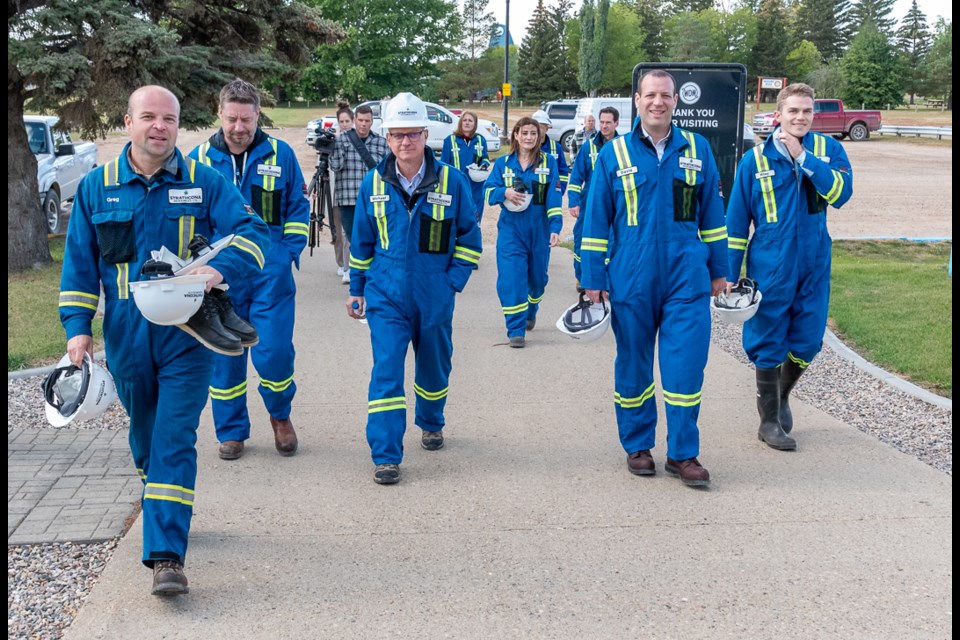NORTH BATTLEFORD - Premier Scott Moe and representatives Strathcona Resources Ltd., the company that recently bought Serafina's thermal facilities, toured those assets Tuesday.
Also there was Kindersley MLA Ken Francis as well as a delegation from Strathcona’s board and executive, including President and CEO Rob Morgan (see the video below).
The tour took them to Strathcona’s facilities located between Lloydminster and Meota. Strathcona recently acquired those in a purchase of Serafina Energy Ltd. earlier this year at a reported $2.3 billion.
The company has four plants in operation today, and Morgan indicated they would like to expand even further with potentially a fifth or sixth plant.
Strathcona, owned by Waterous Energy Fund out of Calgary, is the fourth largest producer in Saskatchewan, producing about 60,000 barrels a day in the province. On a royalty basis, the company paid the province close to $85 million for the first half of the year.
In speaking with reporters at Western Development Museum in North Battleford following the tour, Moe made it known he was impressed with what the company was doing, particularly with respect to emissions at their production sites and even at their loading facilities.
“All of those emissions are being incinerated or being utilized, not being emitted into the atmosphere,” said Moe.
“Some of the greatest innovation in oil production is happening right here in this province and it’s happening right here in this particular oil field.”
Morgan said Strathcona was attracted to Serafina’s assets because of “the technology. It’s unique-to-Saskatchewan technology.”
“In the oil sands reservoirs in Alberta the nature of that would be a large facility to produce steam to basically produce the oil at the end of the day, where in Saskatchewan the nature of the Reservoir‘s are such that we need much smaller scale. And the company was very successful in being able to develop small scale thermal projects, so 10,000 barrel a day projects that could move with the reservoir as it would, and being done and highlighted in a fashion that was energy efficient, make very efficient use of the energies being generated from an emissions perspective.”
Morgan adds the company was investing in engineering studies for carbon capture in storage, looking at the feasibility of capturing emissions from the burning of natural gas to generate steam and then injecting it into the ground.
“That would reduce emissions further by about 60 per cent,” said Morgan. “It would certainly make the oil produced from this facility by far the cleanest in the world. And that to us is a very important hallmark of our industry and our country. We want to promote and produce the clean energy that Canada produces for the rest of the world.”
Premier Moe made it known was excited about the future of the industry. From a jobs perspective, Moe said the government had set a growth target for the industry of 20 to 30 per cent, adding that was a “low target.” Moe pledged his government would put policies in place to allow companies like Strathcona to locate in Saskatchewan.
Moe cited the importance to the province of both creating jobs and also providing energy security. On the latter note, he pointed to issues the European Union was happening in having to buy their energy from Russia, and in turn indirectly funding their invasion of Ukraine.
“We should not in this province, in this country, I would put forward on this continent, ever have a conversation that doesn’t have energy security, food security at the forefront of that conversation. We’re seeing that on full display in the European Union, what ideological political decisions and where that has gotten a number of countries, over 20 countries, in their energy security situation here today.”
Moe was also excited about what he has heard at the Lloydminster Oil Show, which he compared to a “climate change convention” because of the innovations talked about there on lowering emissions.
He pointed to an armchair conversation presentation at the Lloydminster Oil Show the previous week between Morgan and David Yager, on how the heavy oil play in Lloydminster over the past number of decades had provided innovation that could be replicated for the rest of the world.
“What we saw today is that happening again,” said Moe. “Innovation here that is being utilized in this heavy oil play in the northwestern part of Saskatchewan that ultimately is going to be exported to other areas of the world. It’s global-leading innovation and it most certainly is leading the world and in every respect, in particular from the production of sustainable energy.”
Video by Averil Halll/Freelance Photographer




